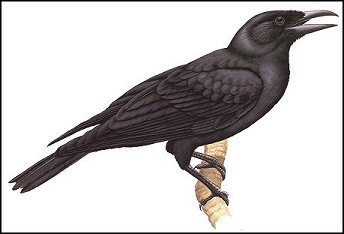|
| 질의: little hermit | 결과: 11번째/14 | |
Mariana Crow (Corvus kubaryi) - Wiki
| 제목: | Mariana Crow (Corvus kubaryi) - Wiki
| |

| 해상도: 344x234
파일크기: 14654 Bytes
등록시간: 2007:12:03 09:25:53
|
Mariana Crow
From Wikipedia, the free encyclopedia
Order: Passeriformes
Family: Corvidae
[Photo] Corvus kubaryi, Mariana crow, Aga (CNMI and Guam). "The only native forest bird to persist in snake-infested habitat, the Mariana crow has probably managed to persist on Guam due to its large size, long life span, and human intervention. However, its survival is now extremely tenuous. The population on Guam is believed to number only 12 individuals, including 4 birds recently translocated from Rota. Little or no successful recruitment into the adult population has occurred since 1986. Intensive efforts have been made by the Guam Division of Aquatic and Wildlife Resources to protect nests in trees from snakes and monitor lizards with electrical barriers on Andersen Air Force Base, but the numbers of nests available for such efforts have declined considerably over the last decade." Source: http://www.fort.usgs.gov/resources/education/bts/impacts/birds.asp
The Mariana Crow (Corvus kubaryi) is a species of the crow family from the north Pacific. It is an endangered species which has steadily declined in numbers since the 1960s.
Description
The Mariana Crow is a small black crow with a bluish-black gloss on its tail, and a greenish-black gloss on its back, underparts, head, and wings. In general, females are smaller than males. An adult weighs about nine ounces (250g) and is about fifteen inches (38cm) long.
Distribution and habitat
The Mariana Crow inhabits second growth and mature forests, as well as coastal strand vegetations, but nests only in native limestone forest. It lives primarily in the northern end of the island of Guam, and Rota in the Northern Marianas Islands where it primarily nests in the two canopy-emergent tree species Elaeocarpus joga and Ficus prolixa.
Behaviour
Diet
Extremely versatile, the Mariana Crow is an opportunistic omnivore, feeding on insects, lizards, other birds' eggs, hermit crabs, fruits, and seeds.
Nesting
The Mariana Crow begins nesting as early as July and as late as March. The nest is a large, cupped platform of small sticks, lined with leaf fibers. Clutch size varies from 1-4 eggs, and both parents incubate the eggs, brood the chicks, and care for the juveniles even after they fledge. Parental care has been known to range from 5 to 18 months, and juveniles may take as long as 3 years before entering the adult breeding cycle.
Voice
The voice is a loud scream of kaaa-ah.
Threats
On Guam, the Mariana Crow's decline is primarily due to predation by the introduced brown tree snake (Boiga irregularis). In spite of protection of nesting-sites by electrical tree barriers, the remaining birds are considered to be reproductively senescent. On Rota, many other threats endanger the crow, including homestead development, resort and golf-course construction, agricultural settlement, nest-predation from introduced rats, the monitor lizard (Varanus indicus), typhoons, disease, and competition with the Black Drongo (Dicrurus macrocercus). More recently, the brown tree snake has also been introduced to Rota, likely leading to serious declines in the Mariana Crow population there if the snake population establishes itself. The Mariana Crow is also persecuted by residents of both islands who see it as an obstacle to development.
Conservation
In 1993, a National Wildlife Refuge was established on Guam to preserve the remaining forest, and birds are being translocated from Rota. Biologically controlling the brown tree snake is also being discussed.
http://en.wikipedia.org/wiki/Mariana_Crow
| The text in this page is based on the copyrighted Wikipedia article shown in above URL. It is used under the GNU Free Documentation License. You may redistribute it, verbatim or modified, providing that you comply with the terms of the GFDL. |
|
^o^
동물그림창고 똑똑전화 누리집
^o^
|
|